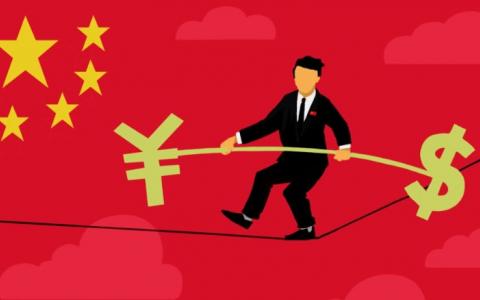
(Bloomberg) If the trade war's objective is to even the playing field for American firms, President Donald Trump isn't going about it the right way. China’s easy access to U.S. dollars over the past decade has fueled asset bubbles, driven an overseas debt binge and laid the groundwork for its low-cost, export-driven economy. Only cutting off the supply of cheap money will reverse this.
So while Trump is pressuring Federal Reserve Chairman Jerome Powell to cut interest rates – questioning the central bank chief's patriotism and calling him "a bigger enemy than Xi Jinping" – the way to wring equitable behavior out of China is for the Fed to hold the line.
Fundamentally, money will go where it can find yield. And however much capital the world has to spare, China has shown an appetite to absorb it. During the most expansive years of quantitative easing in the U.S., foreign money seeking yield went into China labeled as "trade" and "investment."
From 2009 to 2014, China may have taken in as much as $2 trillion in hot money spewing from the Federal Reserve's low interest-rate policy. My company looked at just one measure – the over-invoicing of exports via Hong Kong – in just one year, 2013, and found $390 billion of such flows into China.
Since Beijing's capital controls, at the time, aimed to shut out foreigners eager to bet on a steadily strengthening yuan, speculators looked for bypasses: For example, some trading companies in China would inflate the value of their exports, enabling more money to enter the country as “export receipts.” Exaggerated foreign direct investment was also a popular channel for incoming speculative money, as was debt.
China’s economic story begins and ends with liquidity; with so many dead assets that have to be refinanced every year, the country requires an ever-growing supply of capital. Much more than cheap labor, this cheap capital is what has created bargain-basement export goods. It also fosters anti-competitive behavior. Domestic companies can operate at a much lower cost than their U.S. counterparts, and they are rewarded in capital markets, despite growing evidence of intellectual property theft.
Consider what a decade of near-zero interest-rate policy has done for China:
- IPOs: Chinese companies listed in the U.S. now have a value of about $890 billion. Not even the high-profile delistings and fraud charges against China MediaExpress Holdings Inc. and Sino-Forest Corp. could drain the hype for the IPOs of Alibaba Group Holding Ltd., JD.com Inc. and Vipshop Holdings Ltd.
- Bonds: Investors hungry for yield have lapped up bonds issued by China's riskiest companies. That's enabled firms such as junk-rated China Evergrande Group, one of the country's most indebted developers, to continue tapping U.S. markets. Chinese firms have raised more than 90% of the high-yield Asian dollar debt issued this year. Mainland developers have about $110 billion in offshore junk-rated debt outstanding.
- Dumping: A steady flow of dollars into China fueled an investment splurge that supported the manufacturing of ultra-cheap exports, from DVD players and TV sets to solar panels. China's history of leniency toward borrowers – its first onshore default was in 2014 – meant firms were able to sell their goods at cut-rate prices without worrying about how they'd pay back their loans.
All this means that the best way to curb Chinese excess is to limit the availability of the dollar. Trump’s demand that Powell cut rates by one percentage point is counterproductive to what appears, anyway, to be the goal of the trade war.
There are other, more targeted measures that the U.S. can pursue in tandem. These include:
- Halting new Chinese IPOs in the U.S. American regulators have already ramped up scrutiny over such listings, which have tumbled to $2.8 billion so far this year compared with $29.1 billion in 2014. The U.S. needs to close the door to all share sales until China agrees to enable investigation and prosecution of fraud by listed companies.
- Requiring that American auditors and stock regulators have access to the audit papers of Chinese companies that are part of U.S.-listed entities, under penalty of delisting. The Public Company Accounting Oversight Board, a Washington-based non-profit that scrutinizes audits, also should be permitted to review its members in China, a goal the Securities and Exchange Commission highlighted in recent commentary.
- Taxing incoming Chinese (and other foreign) investment. U.S. Senators Tammy Baldwin and Josh Hawley in late July submitted a bill that would allow the Fed to impose a flexible tax on capital inflows. This measure would make it less attractive to park money in U.S. assets, thereby shrinking the capital account imbalance, and by extension, the trade deficit.
Depending on whether Trump gets his rate cut, China’s slowdown will be fast or slow. By enabling new stimulus, cheap dollars would give the Chinese more rope to hang themselves with. Holding the line will mean Chinese austerity and unemployment. In that case, there would be no way out of economic recession other than an ambitious program of economic reform.



